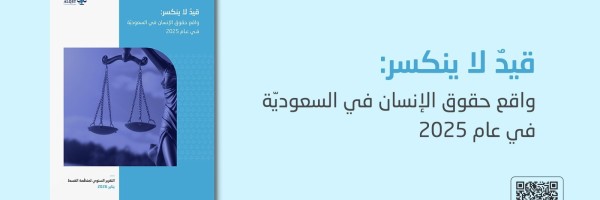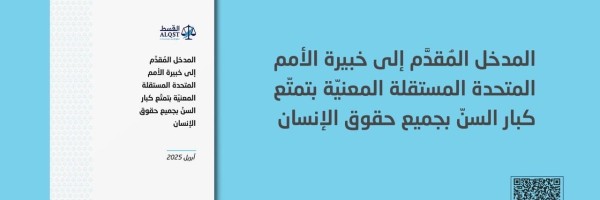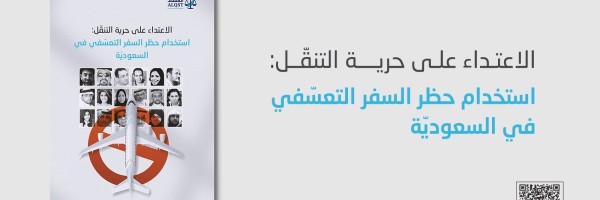“Shrouded in Secrecy: Prisons and Detention Centres in Saudi Arabia”, details sub-standard health and hygiene conditions, reckless medical negligence, and increasing use of private detention facilities to carry out torture.
Executive Summary
The Saudi prison system lacks transparency and independent monitoring. This contributes to the potential for serious violations of prisoners’ rights, including unlawful arrest and detention; prolonged pre-trial detention; systematic use of torture during interrogation; medical neglect and malpractice; and failure to observe guarantees of due process.
Despite limited access to information from relevant institutions in Saudi Arabia, we have attempted to explore the main concerns by examining prison conditions and highlighting notable cases of violations. In addition, ALQST’s researchers conducted a unique survey of current or recent prisoners and people close to them. We identified an emerging and alarming trend of unusual and increased abuse of prisoners’ rights since Crown Prince Mohammed bin Salman came to power, consistent with previous reports published by ALQST and other sources.
Failure to meet legal requirements
The report sets out the legal framework of international and regional standards within which the Saudi prison system operates, and the domestic legislation and regulations relevant to imprisonment and detention. As a member state in the United Nations Saudi Arabia is bound to observe certain legal principles that are, however, weakly adopted in domestic laws and poorly implemented in practice. Certain groups are at particular risk, such as prisoners of conscience, including women, as well as illegal residents and migrants.
The Convention against Torture (CAT) is particularly significant and relevant to this report on prisons and detention centres in Saudi Arabia; the report notes discrepancies between CAT requirements and the Saudi authorities’ interpretation of them.
The Saudi legal system, with its lack of a written penal code, is a major culprit in amplifying rates of detention and imprisonment and violations of due process, as laws are frequently and arbitrarily overridden by royal decrees and ministerial orders. The report critically examines the 1978 Law of Imprisonment and Detention and the 2001 Law of Criminal Procedure, showing both their shortcomings and how their provisions are violated by the authorities’ extensive use of arbitrary arrests and detention, torture and other forms of ill-treatment.
No independent monitoring of prison conditions is permitted or possible. The government’s own officially sponsored human rights bodies, the Saudi Human Rights Commission (HRC) and the National Society for Human Rights (NSHR), appear to function mainly as window-dressing for the authorities, but even they have issued a series of damning reports on conditions in Saudi prisons, which the authorities have largely ignored.
Structure and control of the Saudi prison system
The administrative and control structure of the Saudi prison system broadly consists of general prisons and detention centres under the Ministry of Interior; Mabaheth (intelligence services) prisons and secret detention facilities under the Presidency of State Security; and juvenile care/detention centres under the Ministry of Human Resources and Social Development. Outside this structure, in addition, the authorities make use of unofficial places of detention where some of the worst human rights violations take place in even greater secrecy.
Orchestrated efforts are made by state institutions and loyal domestic media to whitewash the image of political prisons in particular. One journalist prefaced his rosy report on a visit to a Mabaheth prison by directly referencing the widespread perception of such jails as oppressive places in remote and secret locations, with underground cells where inmates are tortured and ill-treated.
Detention facilities for juveniles consist of “social supervision homes” for boys under the age of 18 and “care homes” for girls and young women up to the age of 30. Concerns over conditions in the institutions for young women have periodically surfaced in Saudi media and online, and several cases of suicide or attempted suicide have been reported. A particular concern is that girls and women can only be discharged from either a juvenile care institution or an adult women’s prison into the custody of a male relative; if their families disown them and refuse to collect them from detention they may be forced to remain there indefinitely.
Recent examples of unofficial places of detention being used to conceal torture, or the use of extreme techniques of interrogation that amount to torture, include the detention of wealthy individuals, business people and senior officials in the Ritz-Carlton hotel in Riyadh in November 2017; the torture of a group of women rights activists in a secret facility known as “the hotel” south of Dhahban Prison in Jeddah in 2018; and the brutal physical abuse of cleric Sulaiman al-Dowaish in the basement of a royal palace in 2016.
Chronically poor conditions and systematic use of torture
The report highlights chronically poor conditions in Saudi prisons, detention centres and deportation centres, which are characterised by overcrowding, poor hygiene and sanitation, and medical and administrative neglect. ALQST’s own survey participants fleshed out these findings with horrific details from their lived experience. Medical neglect led to the death in custody in April 2020 of pioneering human rights activist Abdullah al-Hamid, at the age of 69. So too has there been negligence in the handling of infectious diseases, including COVID-19.
One of the hallmarks of the era of King Salman and Crown Prince Mohammed bin Salman has been the systematic use of torture for political purposes. Although ALQST did not document any fresh reports of physical torture during 2020, new information continued to surface concerning torture and ill-treatment in the recent past, often outside the prison system and in informal, private settings. Moreover, given the widespread practice of enforced disappearance and incommunicado detention it is likely that further instances of torture have occurred in secret. The absence of fresh torture reports could therefore signal a more worrying trend than may at first appear. Meanwhile, the Saudi courts continue to dismiss recent torture allegations, as in the case of woman human rights defender Loujain al-Hathloul, thus reinforcing the climate of impunity for those involved.
Respondents to ALQST’s survey provided details of physical and psychological torture as well as solitary confinement and other forms of ill-treatment and general harassment, notably including the cruel denial of family contact and visits, which, as well as causing suffering for both inmates and relatives, also hinders the reporting of wider torture and ill-treatment.
The report notes a number of suspicious deaths in custody that the authorities have refused to investigate. The fact that so many Saudi prisoners, notably human rights activists, have resorted to hunger strikes underlines the unresponsiveness of the prison authorities and the state’s disregard for the rights of those held in Saudi prisons and detention centres.
Recommendations
The report concludes with a detailed set of recommendations addressed to both the international community and the Saudi authorities. International players are urged to exercise due diligence in all dealings with official Saudi entities in terms of the potential impact regarding human rights, and to urge the Saudi authorities to implement the domestic measures recommended. These include:
- substantial reforms to the legal system to bring laws and practices into conformity with international standards;
- allowing prisoners and detainees to know and exercise their rights;
- regular, independent monitoring of prison and detention facilities, and unfettered access for international observers to ensure the safety and welfare of prisoners;
- accelerated development and refurbishment of the prison estate;
- reduction of overcrowding by establishing alternatives to imprisonment and also releasing political prisoners, minor offenders and older prisoners or those with underlying health conditions;
- observance of the minimum health standards set out by the World Health Organisation (WHO) including adequate and timely healthcare, especially for women and prisoners with disabilities;
- a full enquiry into every death in custody; and
- an end to the practice of torture, which should be criminalised in line with the Convention against Torture (CAT), with victims assured of accountability, rehabilitation and redress.




